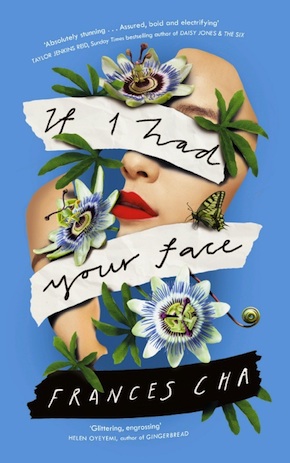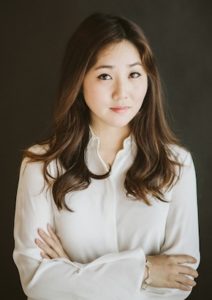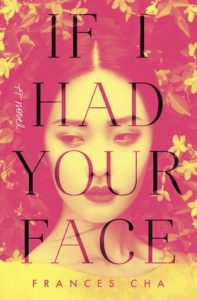Frances Cha: Face to face
by Mark Reynolds
“Troubling, kaleidoscopic, and hugely enjoyable.” Nell Zink
Frances Cha’s bold and unsettling debut novel If I Had Your Face tells the story of four young women attempting to navigate present-day Seoul. Kyuri is a not-entirely-natural ‘room salon’ beauty whose yearning for a true relationship with a wealthy client threatens her work and status; Kyuri’s flatmate Miho is an orphan who won a scholarship at a prestigious New York art school and is now looking for her big break on the Korean art scene; their neighbour Wonna is pregnant, but frantic about securing the means to raise a family; while Kyuri’s hair stylist Ara’s dreamy infatuation with a K-pop idol threatens her mental health. It’s a provocative portrait of a materialistic society in which people are judged and divided by appearance and wealth, and where cosmetic surgery is commonplace, but also a tender celebration of friendship, solace, female strength and resilience.
MR: Wonna states that the main reason she married her husband was because his mother was dead. What is so formidable about the contemporary South Korean mother-in-law in the eyes of a young wife?
FC: I think the landscape is changing a bit now, but traditionally, there has been a history of bad blood between mothers-in-law and daughters-in-law because of the extremely high expectations of the mothers-in-law. Honestly, I personally think a lot of it can be attributed to the sons, because they can be terrible at communicating and acting as the bridge between their wife and mother, and so a lot of misunderstandings arise, which leads to hurt and anger. But if the mother has lavished so much love on the son and has these expectations that the daughter-in-law will act in gratitude to the parents-in-law, when the daughter-in-law obviously has her own priorities and life and her own parents to worry about, then the mother-in-law feels slighted and the daughter-in-law feels misunderstood, both feel aggrieved and it becomes a vicious cycle. But interestingly, these days Korean society tends to regard daughters higher than sons as it’s thought that daughters will take better care of parents in old age, so we will see what this next generation of mothers- and daughters-in-law will look like.
Many young people choose to get married late or not at all, and Korea has the lowest birth rate in the world. And this is alarming for the older generations, who worry for their children and the next generation.”
Miho achieves approval, support and love from individual members of the wealthy elite through her art projects, but is acutely aware that “For all its millions of people, Korea is the size of a fishbowl and someone is always looking down on someone else” – and that any status she manages to acquire will be temporary. Is it impossible for her to achieve lasting success in those circles?
I think in the art world – whether in Korea or anywhere else – it’s so arbitrary who becomes successful and who does not, and once you enter the canon, your career can take off exponentially. So just getting through the gatekeepers is important, and I think Miho is much more aware than most of her peers that her career requires a lot of manoeuvering and politics. I think it’s quite possible, actually, for her to achieve lasting success, but just getting through that initial hurdle is something she is working on.
One of Ara’s customers at the hair salon, a sociology professor, complains that her generation is solely focused on the present, and never looks ahead to the future. Are the reasons for this economic, social, psychological, or a mixture of many factors?
It’s a common complaint among the older generations – in Korea and elsewhere – that the youth of today do not look towards the future and they do reckless things and don’t save up or invest the time for a better future. In Korea, although of course the coronavirus has affected the landscape in ways that we do not know yet, the real-estate prices have become so prohibitively expensive that young people – especially the many unemployed youth – have no hope of every buying an apartment themselves if they do not have parents who are able to support them. This is why many young people choose to get married late or not at all, and why Korea has the lowest birth rate in the world. And this is alarming for the older generations, who worry for their children and the next generation.
You grew up in Texas and Hong Kong before moving to South Korea when you were twelve years old. To what extent did you experience culture shock in that moment? What type of school did you attend, and did you forge enduring friendships with new classmates?
I started sixth grade at a public school in Korea, and that was a huge culture shock not only because of the academic pace and intensity, but because I did not know much of the pop culture that was hugely popular with my peers in Korea (this was before the export of K-pop). Before long I was obsessively reading manhwa (Korean comics), watching all the popular shows, listening to K-pop and attending after-school study institutions called hagwon and was very much the average Korean student. When I think about it, the adjustment was quite drastic and fast. I am still in touch with my middle-school friends from that time, and I’m so grateful for my experience in Korean public school – it really gave me so much material to write about and is the reason why I identify as being from Korea so strongly.
Public school in Korea was a huge culture shock not only because of the academic pace and intensity, but because I did not know much of the pop culture that was hugely popular with my peers.”
How did your work as travel and culture editor for CNN in Seoul help to shape this novel, and what role did writing workshops and courses play in helping you complete it?
My work at CNN was the best training I could have asked for in writing the book – not only because I learned to write on deadline and become completely OK with ‘killing my darlings’ because I went through a very brutal editing process every three hours or so, but it was also essential practice in writing about Korea for a Korean audience, and learning how to contextualise Korean culture and history for a readership that didn’t necessarily know a great deal about Korea. After I left CNN, I relied on weekly workshops for the deadlines, and for testing out how much I could get away with not explaining or defining concepts and words and just relying on context. That kind of feedback was very necessary and helpful.
What are you writing next?
My second novel is due soon, and is more in the vein of literary horror. It is also set party in the States and partly in Korea, and is based on folklore that has been passed down in my family.
Are you still teaching creative writing?
Not at present, but I do want to go back to teaching. Perhaps after this next book has been handed in, I will start to look for a teaching position. I really love forming syllabi and talking about craft with students – honestly, I learn the most through teaching.
How widely have you personally travelled around Korea, and what sights do you particularly recommend to potential visitors once all coronavirus sanctions are lifted?
As the travel and culture editor for CNN in Seoul, I covered Korean locations extensively, and there are many wonderful destinations that are largely undiscovered by international travellers. But there are so many things to see even within Seoul, so perhaps on a third or fourth trip to Korea, they would be able to venture beyond Seoul. Busan, Gyeongju, Jeju Island are all beautiful travel spots.
 Frances Cha is a graduate of Dartmouth College and the Columbia MFA program, and a former travel & culture reporter for CNN in Seoul. Her writing has appeared in The Atlantic, V Magazine, The Believer and other publications. Her short story ‘As Long As I Live’ was published in the Korean-language anthology New York Story (Artizan Books). She has taught Media Studies at Ewha Women’s University, creative writing at Columbia University and Yonsei University, and lectured at Seoul National University. She lives in Williamsburg, Brooklyn with her husband and two daughters and spends summer in Seoul. If I Had Your Face is published in paperback, eBook and audio download by Viking/Penguin.
Frances Cha is a graduate of Dartmouth College and the Columbia MFA program, and a former travel & culture reporter for CNN in Seoul. Her writing has appeared in The Atlantic, V Magazine, The Believer and other publications. Her short story ‘As Long As I Live’ was published in the Korean-language anthology New York Story (Artizan Books). She has taught Media Studies at Ewha Women’s University, creative writing at Columbia University and Yonsei University, and lectured at Seoul National University. She lives in Williamsburg, Brooklyn with her husband and two daughters and spends summer in Seoul. If I Had Your Face is published in paperback, eBook and audio download by Viking/Penguin.
Read more
francescha.com
@Frances_H_Cha
@franceschawrites
Author portrait © Storybymia
Mark Reynolds is a freelance editor and writer, and a founding editor of Bookanista.
@bookanista
wearebookanista


